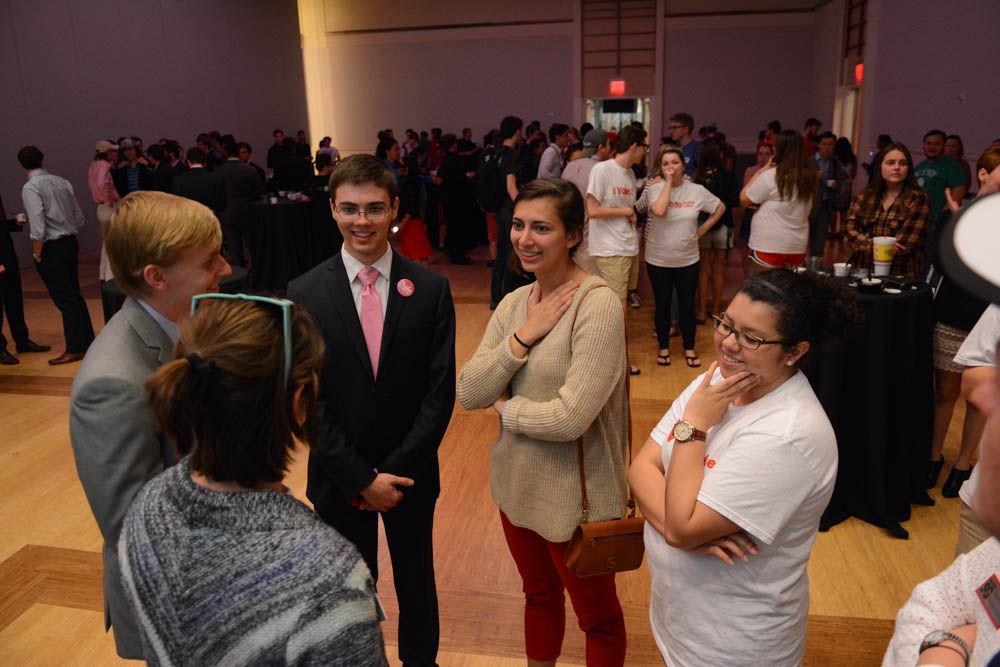Before runoff elections Thursday, the remaining two student body president and student body vice president candidates participated in a final debate to outline their campaign platforms March 1 in Talley Student Union.
The Student Government Board of Elections hosted the runoff election debate, which featured presidential candidates Jackie Gonzalez, a junior studying political science, and Brad Barbee, a junior studying statistics, as well as their vice presidential running mates Mia Connell, a sophomore studying sociology, and Jack Pashby, a senior studying nuclear engineering. Gonzalez and Connell received 28.6 percent of the vote, while Barbee and Pashby received 28.48 percent on Feb. 28, according to the Board of Elections.
A substantial portion of the debate was about protecting free speech while simultaneously protecting the rights and safety of students on campus.
“Me and Jack are for free speech,” Barbee said. “I think that we have said that over and over again, and more so than any other candidate. When hate speech does arise and it has, and we’ve seen it arise very recently within this school, we have to use it as a teaching moment for the university, we have to reach out to students and let them know why hate speech is wrong. It cannot be tolerated on this campus.”
Gonzalez addressed students’ concerns with her response to a similar prompt at the previous debate.
“The quote that was used in the Technician that said, ‘I do not speak on behalf of students —’ that was not taken out of context,” Gonzalez said. “What I meant by that was that the best person to speak on behalf of yourself and tell about your experiences is you. I will make sure that you have all of the resources that you need so that you can tell your story.”
The debate also focused on protecting and fostering the well-being of students of color and diverse communities on campus.
“Jackie and I come from a niche,” Connell said. “We are two Latinx women; we understand what it’s like to be a minority in a predominantly white institution. I think the steps to go about to make sure that our students of color feel comfortable is uplifting the communities on campus that have these education programs, have these advocacy programs and have these initiatives — making sure that they are being uplifted through the resources we have as a Student Government, and then making sure that we, as Student Government members are there, are further educating ourselves so that we can represent them through Student Government.”
Barbee and Pashby took a different stance on the issue, stating that they would appeal to commonalities between students.
“We’re going to stop focusing on what makes everyone different on this campus and start focusing on what makes everyone the same,” Barbee said. “Every single student on this campus has common goals: They all want to graduate on time, they all want to be able to feel safe on this campus, and we’re going to make sure that we communicate that every single day in our administration.”
When asked about methods maintaining transparency with regard to sexual assault while decreasing the amount of sexual assault cases on campus, both parties affirmed commitment to education as a mitigating factor.
“One of our main platform points is our increased amount of resident mentors in dorms to ensure that survivors do have a place to report to and feel safe in,” Pashby said.
Barbee followed Pashby’s answer, affirming a platform of educating students about different sexual assault reporting procedures.
“What is a confidential report versus what is not a confidential report and really just educating people about what these types of reporting methods are — if they know this, then reporting rates will go up, and we think that it will definitely take some big strides towards preventing sexual assault,” Barbee said.
Gonzalez reaffirmed her commitment to preexisting sexual assault education and awareness initiatives more so than Student Government-based education initiatives.
“I think that we can’t rely on survivors to tell their own story and to educate others,” Gonzalez said. “We have to take it upon ourselves as student leaders to make sure that everyone on campus has the education that they need and understands the resources that they have, like the Women’s Center, and the Counseling Center and other organizations on campus. We want to make sure that those are uplifted so that students can go to them.”
Despite having abstained from voting on Resolution 78, a Student Senate bill affirming Student Government’s condemning anti-LGBTQ+ sentiment, the Gonzalez campaign reaffirmed its solidarity with the LGBTQ+ community at NC State.
“I think that we each had our own reasons to abstain,” Gonzalez said. “Mine was because I knew that the bill was going to pass, and I really had to use the restroom, so I really apologize for that, and I made it very clear to everyone around me. I spoke to the sponsors of the bill, and if I could go back and change that, I would. Mia and I stand completely in solidarity with the GLBT community, and that’s something that they have never questioned us about.”
Overall, the candidates used the debate as a means to provide a final portrait of their qualifications for president and vice president of Student Government before the runoff election Thursday. Gonzalez and Connell cited their experiences within Student Government as a central characteristic of their qualification for their positions.
Barbee and Pashby affirmed a commitment to an improvement of dynamics between Student Government and students.
“Students don’t know what student government does,” Barbee said. “Me and Jack are here for change. We are here to have a Student Government that focuses on the impact that we can have on students … We are focused on coming together as a student body and as a Student Government for change and initiative that really, positively, tangibly benefit the Wolfpack experience.”
So far, the Gonzalez-Connell campaign has raised $711.12 and the Barbee-Pashby campaign has raised $675.39 of their $800 general campaign limit, according to the Board of Elections’ financial disclosures. The Board permits an additional fundraising of $400 for the runoff elections but has not yet received reports from either campaign.
Runoff voting will occur March 2 from 8 a.m. to 8 p.m. at getinvolved.ncsu.edu.
Brad Barbee, a junior studying statistics, is running for student body president.









